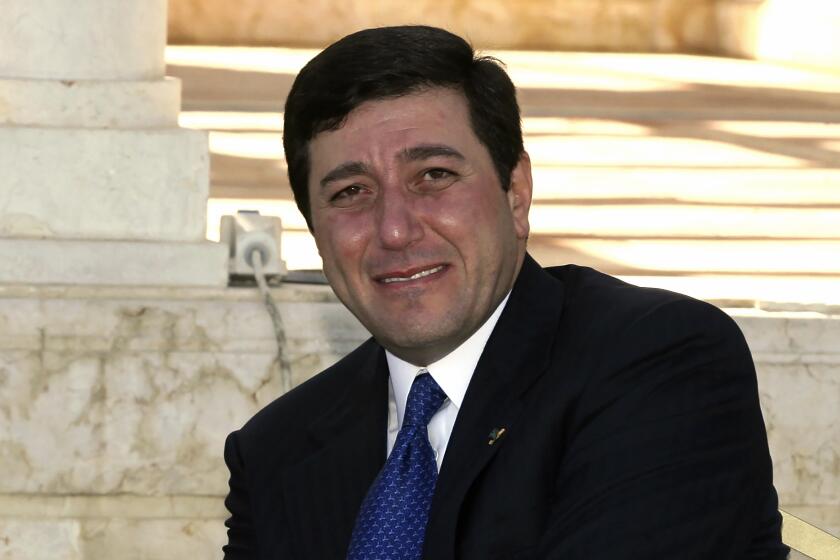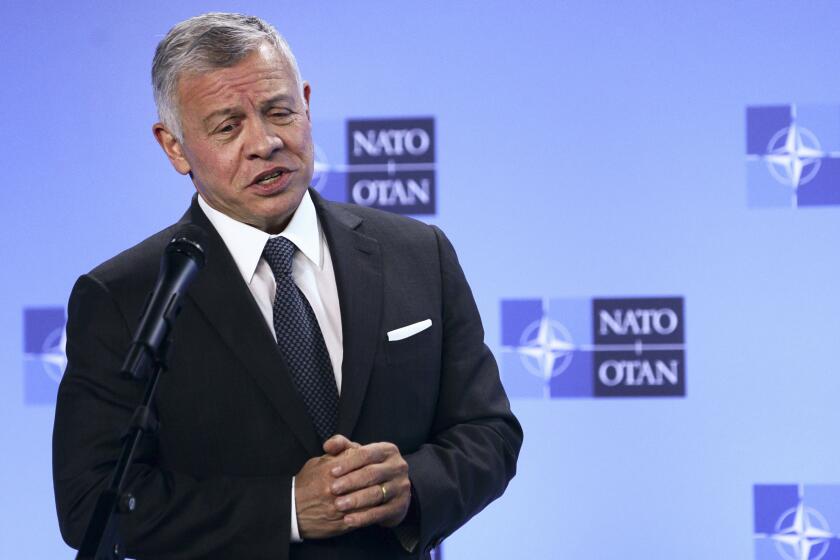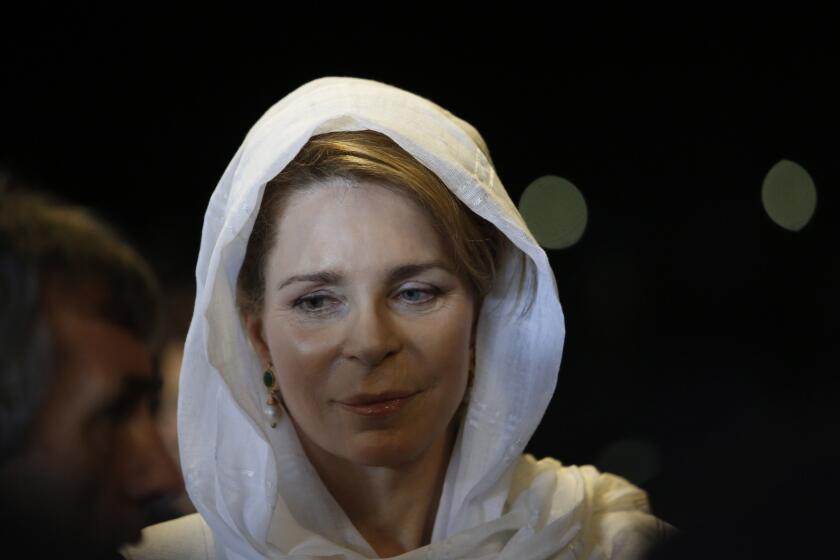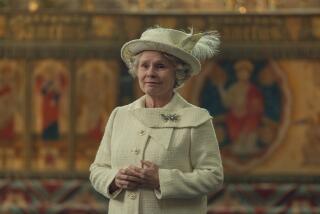In Jordan, a lavish royal wedding doubles as a princely coming-out party
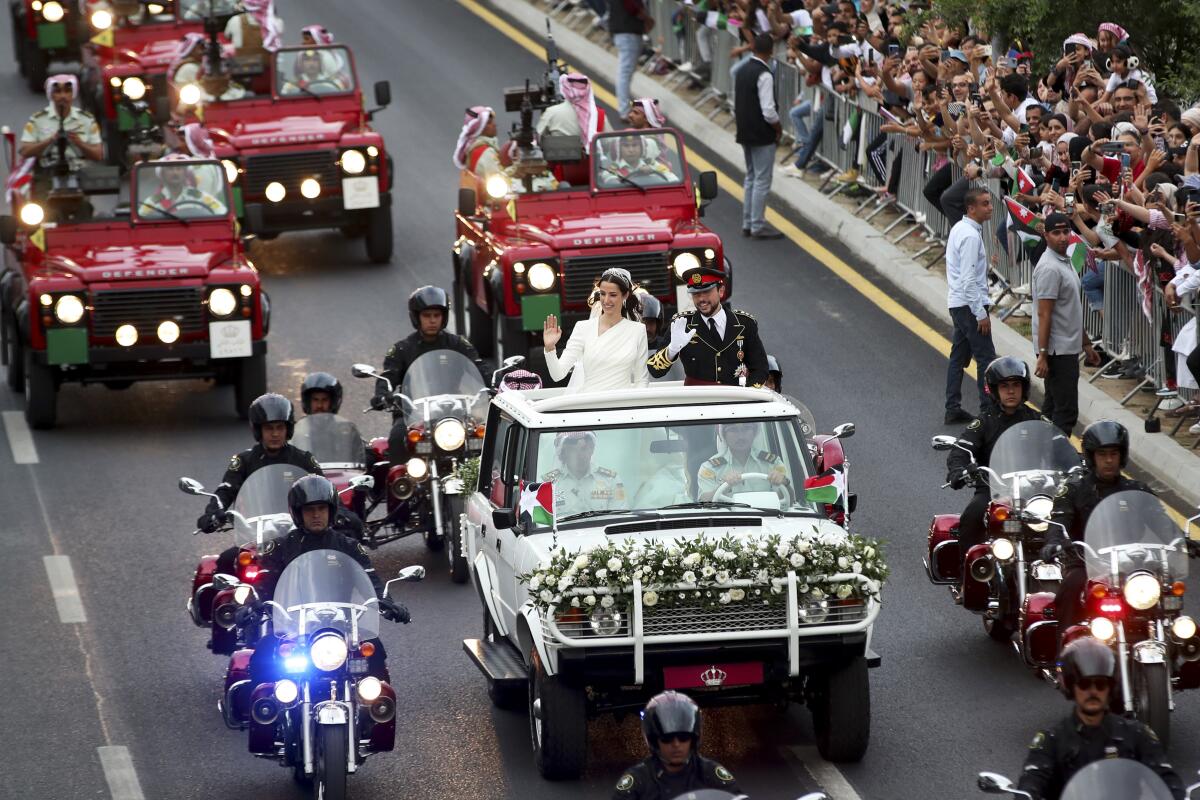
AMMAN, Jordan — A guest list of glitterati from around the world, including Britain’s Prince William and his wife, Kate, and First Lady Jill Biden. Elaborate ceremonial events and concerts headlined by top Arab pop stars. An entire capital festooned with flags and banners in anticipation of the big event, with a public holiday announced so that thousands can — if only vicariously — join in the fun.
It’s all part of the royal wedding fever that has gripped Jordan as this desert kingdom and key U.S. ally in the Middle East celebrates the nuptials Thursday of Crown Prince Hussein, 28, and Rajwa al Saif, a 29-year-old Saudi architect who finished her studies at the Fashion Institute of Design & Merchandising in Los Angeles, where she also worked at an architecture firm.
In recent weeks, images of the beaming couple have become a ubiquitous sight, adorning cars, buses and buildings all over the country. You can’t swing a Hashemite ceremonial sword (like the one presented to Hussein as a gift from his father Wednesday) without hitting a sign bearing the occasion’s official slogan, “Celebrating Al Hussein,” complete with logo with stylized Arabic lettering; the design was even used by airport authorities Thursday as the country’s visa stamp.
Such extravagance is rare for Jordan’s royal family, which heads an impoverished country with few natural resources, chronically high unemployment and 11 million people who often complain about government waste and corruption.
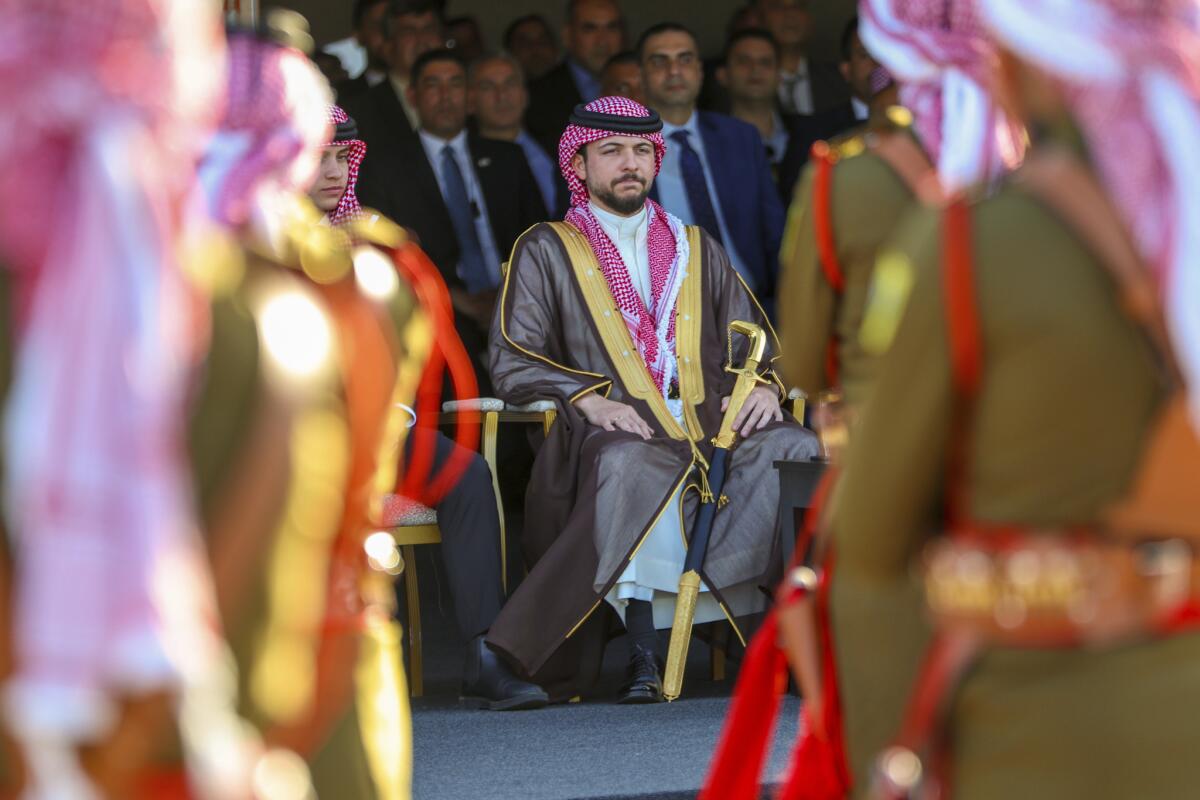
But the event is about far more than the nuptials. It’s a massive coming-out party for Hussein two years after his father, King Abdullah II, thwarted an alleged coup plot involving the former crown prince, his own half-brother, Hamzah, who was accused of conspiring to overthrow the monarch and take over the country. Hamzah remains under house arrest and did not appear at various pre-wedding events Wednesday with other members of the royal family.
The alleged plot brought into the open the rivalries that the Hashemite dynasty has assiduously tried to keep behind palace doors. It also spurred a raft of criticism of Abdullah, with many contrasting the popularity of Hamzah and his common touch — especially among Jordan’s all-important tribes — with the aloofness of the king.
A former top confidant of Jordan’s King Abdullah II and a relative of the monarch are found guilty of sedition and incitement in a high-profile trial.
Abdullah had stripped Hamzah of the title of crown prince in 2004, naming Hussein heir to the throne five years later when the boy was only 15. Over the last decade and a half, the king has strived to raise his son’s public profile, including taking him to the United Nations General Assembly to speak in 2017.
The alleged coup plot in April 2021 only highlighted Abdullah’s need to shore up his family’s legitimacy and their rule over Jordan. Since then, the promotional campaign for Crown Prince Hussein has gone into overdrive, said Amer Sabaileh, a political analyst based here in Amman, the Jordanian capital.
“It accelerated after Hamzah so as to end that chapter,” he said.
Hussein is now a fixture with his father at most public events and often represents Jordan in meetings with other leaders. Hussein has taken an active interest in economic initiatives and was dispatched by the king to negotiate Jordan’s 5G rollout with the U.S. and China.

The wedding augurs a more prominent role for Hussein well beyond the constitutional limits of his current position, Sabaileh said.
“He’s no longer a protocol crown prince. It’s clear he’s playing for something greater,” Sabaileh said, adding that Hussein’s pre-wedding celebrations have brought him in direct contact with government officials and the army he is supposed to lead in the future. (In Jordan, the king is the supreme commander of the armed forces.)
On Wednesday, the royal family joined thousands of officials and dignitaries to watch a traditional dance performance and displays of military might that included aerobatic maneuvers by Jordan’s U.S.-supplied F-16s.
Jordan’s King Abdullah II denies impropriety in his purchases of luxury homes abroad, which were revealed in a massive leak of financial documents.
State television has featured nothing but wedding-related content for days, including interviews with the crown prince and his family and live broadcasts of events, all interspersed with constant commentary from guests gushing effusively about the importance of the occasion.
The wedding began Thursday afternoon and was scheduled to continue into the evening with about 1,700 people in attendance. Guests invited to the religious marriage ceremony streamed into Amman’s Zahran Palace and greeted King Abdullah and his wife, Queen Rania. Biden and her daughter, Ashley, arrived in a pair of black Suburbans.
Then came the crown prince in full military regalia, followed by Al Saif, who arrived in a 1968 Rolls-Royce built for the mother of the late King Hussein, Abdullah’s father. With Abdullah and Al Saif’s father, Khaled, on either side of them, the couple exchanged rings as the crowd ululated.
Outside the palace, thousands lined the streets of Amman, many of them wrapped in traditional red-and-white scarves. In other cities, giant screens were set up for public viewing of the live broadcast.
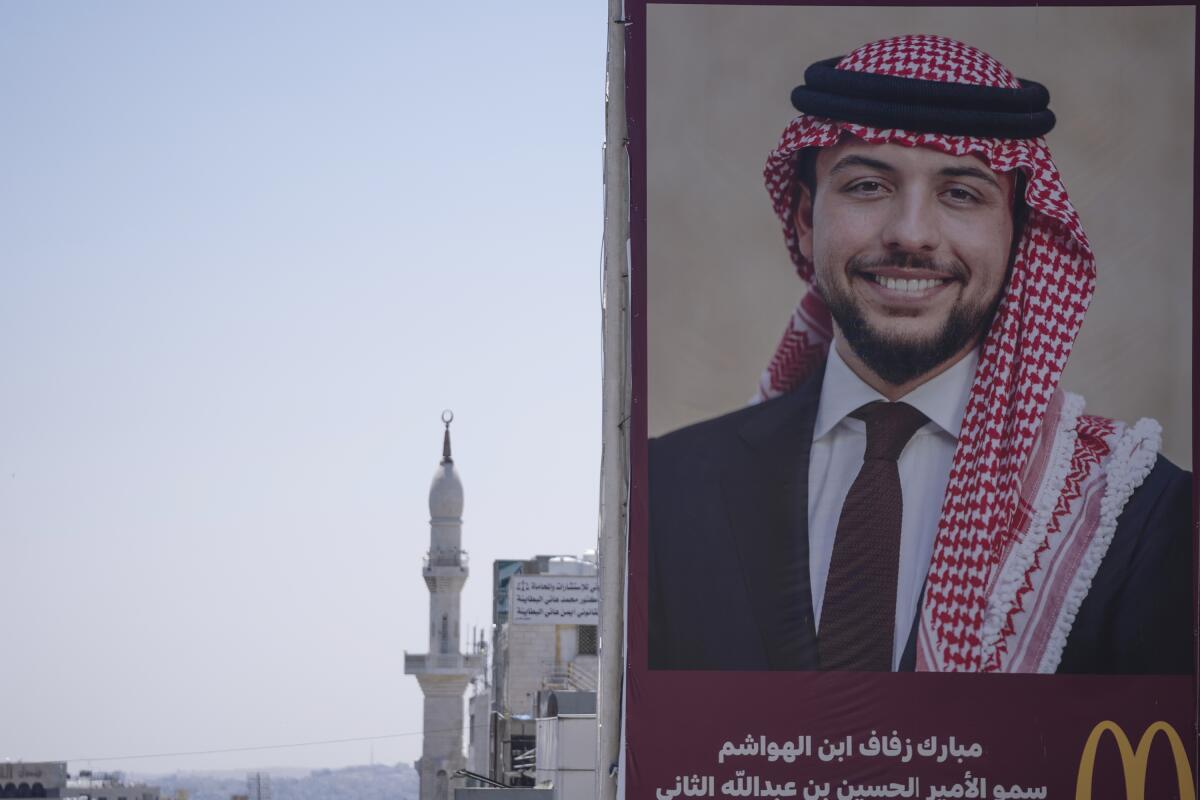
Hussein’s choice of Al Saif as his wife carries potential political benefit for Jordan. Her father leads one of Saudi Arabia’s largest contracting companies. Her mother is Azza Sudairi, a relative of the mother of Saudi King Salman.
Jordan and Saudi Arabia have had a hot-cold relationship. The Hashemites originally hailed from Saudi Arabia and historically competed with the House of Saud for control. In years past, Saudi Arabia was a lifeline, investing and pumping aid into Jordan’s perennially strapped economy. But that aid has dried up in recent years as Saudi Arabia and other oil-rich states focus on their own development.
Jordan hopes to capitalize on Saudi Arabia’s “giga-projects” — colossal developments such as the Massachusetts-sized megacity Neom, which includes plans to create links to the Jordanian coastal city of Aqaba and cities in Egypt.
Who is Queen Noor? Royal drama emerges, nearly 43 years after an American’s marriage to Jordan’s King Hussein.
The union of Al Saif and the crown prince appears to have been well-received in Riyadh, the Saudi capital. Arab News, the Saudi state-owned English-language newspaper, plastered a picture of the couple on its front page with the headline: “The kingdom’s bride and joy.” It also featured an interview with Jordan’s ambassador to Saudi Arabia, Ali Kayed, who spoke of how the two countries were “a model of cohesion in Arab relations.”
“There are no cultural differences between Jordan and Saudi Arabia,” Kayed said. “They are united by an inherent brotherhood, a similar heritage, and neighborly relations cementing the bonds of love and strength between the two peoples.”
After his wedding, the crown prince will continue being groomed to take over ruling the country, which faces a host of challenges. The population is growing at a rate that long ago outstripped its meager resources, and climate change is set to exacerbate problems, raising the specter of Jordan soon losing viable sources of fresh water.
Start your day right
Sign up for Essential California for the L.A. Times biggest news, features and recommendations in your inbox six days a week.
You may occasionally receive promotional content from the Los Angeles Times.
Hussein will need to show Jordanians that he is up to the task.
“You have to be very careful how to market yourself,” said Sabaileh, the analyst. “That’s why it’s a matter of what he’ll do after the wedding to show real change.”
More to Read
Sign up for Essential California
The most important California stories and recommendations in your inbox every morning.
You may occasionally receive promotional content from the Los Angeles Times.
